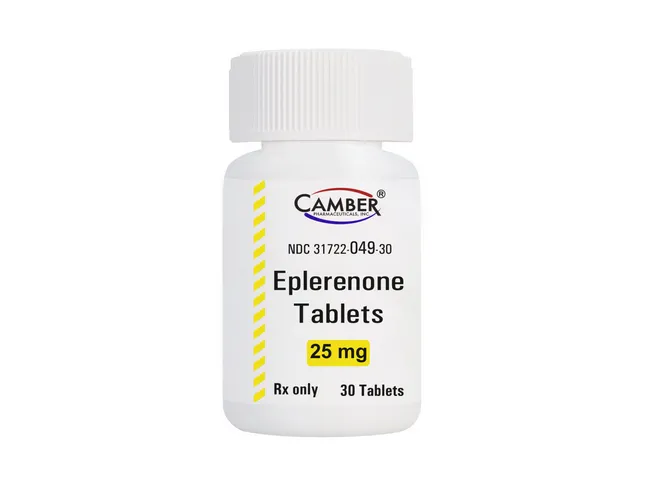Comprehensive Guide to Eplerenone: Uses, Dosage, Side Effects, and More
What is Eplerenone?
Overview of Eplerenone
Generic Name: Eplerenone
Brand Name: Inspra, generics
Drug Group: Aldosterone antagonist (mineralocorticoid receptor antagonist, diuretic)
Commonly Used For
- Treat heart failure post-myocardial infarction.
- Manage hypertension.
- Reduce cardiovascular mortality in specific populations.
Key Characteristics
Form: Oral tablets (25 mg, 50 mg) (detailed in Dosage section).
Mechanism: Selectively inhibits aldosterone receptors, promoting diuresis and cardioprotection.
Approval: FDA-approved (2002 for Inspra) and EMA-approved for heart failure and hypertension.

Indications and Uses of Eplerenone
Eplerenone is indicated for cardiovascular and renal conditions, leveraging its aldosterone-blocking properties:
Heart Failure Post-Myocardial Infarction (MI): Treats heart failure with reduced ejection fraction (HFrEF) after MI, improving survival rates, per cardiology guidelines, supported by the EPHESUS trial.
Hypertension: Manages essential hypertension, either alone or with other antihypertensives, reducing blood pressure, per hypertension management protocols.
Chronic Heart Failure (NYHA Class II-IV): Used to alleviate symptoms and reduce hospitalizations in stable HFrEF, enhancing quality of life, supported by clinical studies.
Resistant Hypertension: Treats resistant hypertension when combined with other agents (e.g., ACE inhibitors), improving control, per nephrology research.
Primary Aldosteronism: Investigated off-label to manage primary hyperaldosteronism (Conn’s syndrome), reducing aldosterone excess, with endocrinology evidence.
Diabetic Nephropathy: Explored off-label to slow progression in diabetic kidney disease, protecting renal function, supported by nephrology trials.
Atrial Fibrillation: Used off-label to reduce atrial fibrillation recurrence in heart failure patients, improving rhythm control, with cardiology data.
Chronic Kidney Disease (CKD): Managed off-label in CKD to mitigate proteinuria and fibrosis, enhancing renal outcomes, per kidney disease studies.
Liver Cirrhosis with Ascites: Investigated off-label to manage ascites in cirrhosis, reducing fluid retention, with hepatology evidence.
Post-Cardiac Surgery Edema: Explored off-label to prevent fluid overload post-cardiac surgery, aiding recovery, supported by cardiac surgery research.
Dosage of Eplerenone
Dosage for Adults
Heart Failure Post-MI:
- Initial: 25 mg once daily, titrated to 50 mg once daily within 4 weeks, if tolerated.
Hypertension:
- Initial: 50 mg once daily, increased to 100 mg if needed, taken with or without food.
Chronic Heart Failure (NYHA Class II-IV):
- 25–50 mg once daily, adjusted based on potassium and renal function.
Dosage for Elderly (≥65 years)
Initial: 25 mg once daily, with a maximum of 50 mg due to reduced clearance and higher sensitivity.
Adjustment: Titrate cautiously, monitoring for hyperkalemia.
Dosage for Pregnant Women
Pregnancy Category B: Avoid unless benefits outweigh risks (e.g., severe heart failure). Consult an obstetrician, with fetal monitoring.
Dosage Adjustments
Renal Impairment: Reduce to 25 mg/day if CrCl 30–50 mL/min; avoid if CrCl <30 mL/min.
Hepatic Impairment: Mild (Child-Pugh A): No adjustment; moderate (Child-Pugh B): Reduce to 25 mg/day; severe (Child-Pugh C): Avoid.
Concomitant Medications: Adjust if combined with potassium-sparing drugs (e.g., ACE inhibitors, ARBs), increasing hyperkalemia risk.
Hyperkalemia: Discontinue or reduce dose if serum potassium >5.5 mEq/L.
Additional Considerations
- Take this active ingredient with or without food, using a full glass of water, at a consistent time daily.
- Monitor potassium levels weekly during initiation and monthly thereafter.
How to Use Eplerenone
Administration:
Swallow tablets whole with water, with or without food; avoid crushing or chewing.
Take at the same time daily to maintain steady blood levels.
Timing: Use once daily, preferably in the morning, as directed.
Monitoring: Watch for swelling, fatigue, or signs of hyperkalemia (e.g., muscle weakness).
Additional Tips:
- Store at 20–25°C (68–77°F), protecting from moisture and light.
- Keep out of reach of children due to toxicity risk.
- Report severe dizziness, irregular heartbeat, or signs of kidney issues immediately.
Contraindications for Eplerenone
Hypersensitivity: Patients with a known allergy to Eplerenone or aldosterone antagonists.
Severe Renal Impairment: Contraindicated if CrCl <30 mL/min due to accumulation risk.
Severe Hepatic Impairment: Contraindicated in Child-Pugh Class C due to toxicity.
Hyperkalemia: Avoid if serum potassium >5.5 mEq/L.
Concurrent Potassium-Sparing Diuretics: Contraindicated with spironolactone or amiloride.
Warnings & Precautions for Eplerenone
General Warnings
Hyperkalemia: Risk of elevated potassium levels; monitor serum potassium regularly.
Hypotension: Risk of symptomatic hypotension, especially with ACE inhibitors; adjust dose.
Renal Dysfunction: Risk of worsening kidney function; check creatinine and eGFR.
Gynecomastia: Rare risk due to hormonal effects; monitor breast changes.
Adrenal Insufficiency: Risk in patients with adrenal disorders; assess cortisol levels.
Additional Warnings
Metabolic Acidosis: Rare risk in renal failure; monitor acid-base balance.
Cardiac Arrhythmias: Risk with hyperkalemia; monitor ECG if symptomatic.
Liver Injury: Rare hepatotoxicity; check liver enzymes in chronic use.
Dehydration: Risk with diuretic overuse; ensure adequate hydration.
Hypersensitivity Reactions: Rare anaphylaxis; discontinue if swelling occurs.
Use in Specific Populations
Pregnancy: Category B; avoid unless critical; use minimal effective dose.
Breastfeeding: Avoid due to potential effects on infants; monitor closely.
Elderly: Higher risk of hyperkalemia and hypotension; start with 25 mg.
Children: Not recommended due to lack of safety data.
Renal/Hepatic Impairment: Adjust dose; avoid in severe cases.
Additional Precautions
- Inform your doctor about kidney disease, diabetes, or medication history before starting this medication.
- Avoid salt substitutes containing potassium due to hyperkalemia risk.
Overdose and Management of Eplerenone
Overdose Symptoms
- Hyperkalemia, hypotension, or nausea.
- Severe cases: Cardiac arrest, renal failure, or metabolic acidosis.
- Fatigue, muscle cramps, or irregular heartbeat as early signs.
- Coma or profound weakness with extremely high doses.
Immediate Actions
Contact the Medical Team: Seek immediate medical help.
Supportive Care: Administer sodium polystyrene sulfonate for hyperkalemia, IV fluids for hypotension, and monitor vital signs.
Specific Treatment: No specific antidote; manage electrolytes and support cardiac function.
Monitor: Check potassium levels, ECG, and kidney function for 24–48 hours.
Additional Notes
- Overdose risk is moderate; store securely and limit access.
- Report persistent symptoms (e.g., severe weakness, irregular pulse) promptly.
Side Effects of Eplerenone
Common Side Effects
- Hyperkalemia (5–10%, managed with diet)
- Dizziness (3–7%, relieved with rest)
- Fatigue (2–6%, decreases with tolerance)
- Headache (2–5%, managed with hydration)
- Cough (1–4%, transient)
These effects may subside with dose adjustment.
Serious Side Effects
Seek immediate medical attention for:
- Electrolyte: Severe hyperkalemia or hyponatremia.
- Cardiac: Arrhythmias or heart block.
- Renal: Acute kidney injury or oliguria.
- Metabolic: Metabolic acidosis or dehydration.
- Allergic: Rash, angioedema, or anaphylaxis.
Additional Notes
- Regular monitoring for potassium, kidney function, and cardiac status is advised.
- Report any unusual symptoms (e.g., muscle weakness, swelling) immediately to a healthcare provider.
Drug Interactions with Eplerenone
This active ingredient may interact with:
- CYP3A4 Inhibitors: Increases levels (e.g., ketoconazole, itraconazole); reduce dose.
- CYP3A4 Inducers: Decreases levels (e.g., rifampin, carbamazepine); adjust dose.
- Potassium-Sparing Drugs: Enhances hyperkalemia (e.g., ACE inhibitors, ARBs); monitor.
- NSAIDs: Reduces efficacy and increases renal risk; use cautiously.
- Antihypertensives: Potentiates hypotension (e.g., beta-blockers); adjust dose.
Action: Provide your healthcare provider with a complete list of medications.
Patient Education or Lifestyle
Medication Adherence: Take this aldosterone antagonist as prescribed for heart failure or hypertension, following the exact schedule.
Monitoring: Report dizziness, swelling, or signs of hyperkalemia immediately.
Lifestyle: Reduce salt intake; avoid excessive potassium-rich foods (e.g., bananas).
Diet: Take with or without food; avoid grapefruit juice due to CYP3A4 inhibition.
Emergency Awareness: Know signs of kidney issues or cardiac irregularities; seek care if present.
Follow-Up: Schedule regular check-ups every 1–3 months to monitor potassium, kidney, and heart health.
Pharmacokinetics of Eplerenone
Absorption: Well-absorbed orally (peak at 1–2 hours); food slightly increases bioavailability.
Distribution: Volume of distribution ~50 L; 50% protein-bound.
Metabolism: Hepatic via CYP3A4 to inactive metabolites.
Excretion: Primarily renal (67% as metabolites); fecal (32%); half-life 4–6 hours.
Half-Life: 4–6 hours, with steady-state achieved in 2 days.
Pharmacodynamics of Eplerenone
This drug exerts its effects by:
Selectively blocking aldosterone receptors in the distal tubule, promoting sodium and water excretion.
Reducing myocardial fibrosis and ventricular remodeling in heart failure.
Lowering blood pressure and protecting renal function in hypertension.
Exhibiting dose-dependent risks of hyperkalemia and hormonal imbalances.
Storage of Eplerenone
- Temperature: Store at 20–25°C (68–77°F); protect from moisture and excessive heat.
- Protection: Keep in original container, away from direct sunlight and humidity.
- Safety: Store in a locked container out of reach of children and pets due to toxicity potential.
- Disposal: Dispose of unused tablets per local regulations or consult a pharmacist, using drug take-back programs.
Frequently Asked Questions (FAQs)
Q: What does Eplerenone treat?
A: This medication treats heart failure and hypertension.
Q: Can this active ingredient cause high potassium?
A: Yes, hyperkalemia is possible; monitor levels.
Q: Is Eplerenone safe for children?
A: No, not recommended due to lack of data.
Q: How is this drug taken?
A: Orally as tablets once daily, as directed.
Q: How long is Eplerenone treatment?
A: Often long-term for heart failure, with monitoring.
Q: Can I use Eplerenone if pregnant?
A: Yes, with caution; consult a doctor.
Regulatory Information
This medication is approved by:
U.S. Food and Drug Administration (FDA): Approved in 2002 (Inspra) for heart failure post-MI and hypertension.
European Medicines Agency (EMA): Approved for heart failure and hypertension management.
Other Agencies: Approved globally for cardiovascular conditions; consult local guidelines.
References
- U.S. Food and Drug Administration (FDA). (2023). Inspra (Eplerenone) Prescribing Information.
- Official FDA documentation detailing the drug’s approved uses, dosage, and safety.
- European Medicines Agency (EMA). (2023). Eplerenone Summary of Product Characteristics.
- EMA’s comprehensive information on the medication’s indications and precautions in Europe.
- National Institutes of Health (NIH). (2023). Eplerenone: MedlinePlus Drug Information.
- NIH resource providing detailed information on the drug’s uses, side effects, and precautions.
- World Health Organization (WHO). (2023). WHO Model List of Essential Medicines: Eplerenone.
- WHO’s consideration of Eplerenone for cardiovascular therapy.
- Journal of the American College of Cardiology. (2022). Eplerenone in Heart Failure.
- Peer-reviewed article on Eplerenone efficacy (note: access may require a subscription).
